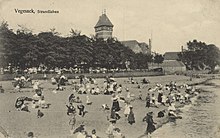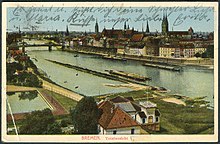Albert Rosenthal (publisher)
Albert Rosenthal (born 1. November 1861 in Bentschen , died 21st November 1942 in Theresienstadt ) was a German merchant , postcards - publisher and photographer .
Life

"Design 2" with artist signature and additional print "Stephan-Post"

Number 53 , light pressure , in the First World War in 1918 as a field post sent to the "Corporal Otto Inrisch"
Albert Rosenthal, married to Carolina, nee Samuel, opened his company in 1891 and already specialized in postcards in the 1890s. He was in competition with other Bremen postcard publishers. At the turn of the century, Rosenthal added other city motifs to its range. The black and white pictures were partially colored by hand. The stitches , which were initially filigree, were soon replaced by photographic recordings.
In addition to his collotype photos , for which he also appeared as a photographer, as in the case of number 204 with the motif of the Bremen stock exchange , Rosenthal also published photos such as the one labeled "Design 2", one with the artist's signature and the additional print “Stephan-Post” as well as “legally protected” multi-color printing of the (old) Geestebrücke in Bremerhaven .
The Rosenthals also experienced the first real boom in postcards during World War I , as most of the field post was sent by postcard.
Rosenthal ran his "luxury paper wholesaler and postcard publisher" in the house at Charlottenstrasse 28 in Bremen. His two younger sons Herbert (born 1895) and Hermann (born 1904) worked there, and they also used the building as a rental residence. The entrepreneur himself lived as the owner with his wife and eldest son Arthur (born 1892) in the Osterdeich 107e house .
Both Albert Rosenthal and his sons were sponsors of the sports club Werder Bremen and donated funds, for example, for the " sports ground - Fund " of the association.
After the seizure of power by the Nazis in 1933, the reprisals against Jews intensified steadily, culminating first in the arrest of Albert Rosenthal and his sons during the November pogroms 1938 . All of them were released from custody for reasons that were later unclear. Shortly afterwards, however, the decree on the elimination of Jews from German economic life at the end of the year forced Albert Rosenthal and his relatives to move from his previously own residence on Osterdeich to the family's building in Charlottenstrasse 28, where they are now only squeezed together Rent could live.
Hermann of Rosenthal's sons emigrated to the USA in 1939, Herbert to Ecuador in 1940. Only Arthur stayed with his parents. However, he was brought to the Minsk ghetto on November 18, 1941 during the deportation of Jews from Bremen , where he died. The Rosenthals stayed in Bremen without children. However, both were deported to the Theresienstadt ghetto on July 23, 1942 . Albert Rosenthal succumbed there just a few months later. Carolina Rosenthal experienced the liberation of the ghetto, from where she was able to return to Bremen.
Meanwhile, the Rosenthal company had been continued by two of the company's employees. However, in the post-war period , the publishing company was finally sold by "a descendant of the Jewish family" in 1948.
Carolina Rosenthal died in Bremen on November 2nd, 1956. The former Rosenthal family business was continued as a papeterie publishing house from 1974 .
Stumbling blocks have been laid for members of the Rosenthal family .
See also
literature
general:
-
Herbert Black Forest :
- Greetings from Bremen. Postcards around the turn of the century , Bremen: Röver, 1975, ISBN 978-3-87681-056-0 and ISBN 3-87681-056-6
- Greetings from Bremen. The old town on early postcards ; Bremen: Edition Temmen, 1998, ISBN 3-86108-611-5
special:
- Harald Klingebiel : Jewish athletes at Werder Bremen , in Arnd Krüger , Bernd Wedemeyer-Kolwe (ed.): Forgotten, repressed, rejected. On the history of exclusion in sport. Conference report of the 10th Hoayer Conference on Sports History from October 10 to 12, 2008 (= series of publications by the Lower Saxony Institute for Sports History eV (NISH) , Series 1: Scientific Series , Vol. 21), Berlin; Münster: Lit, 2009, ISBN 978-3-643-10338-3 , p. 50ff.
Web links
- Barbara Johr: Albert Rosenthal, * 1861 on the page stolpersteine-bremen.de
- Steffy van Valanger, Stefan Münster: Catalog list for the current codes / numbers of the Albert Rosenthal publishing house, around 1900 on the artinlandscape.com page
Individual evidence
- ↑ a b c d e f g h i Barbara Johr: Albert Rosenthal, * 1861 on the page stolpersteine-bremen.de in the version from 2011, last accessed on September 27, 2019
- ↑ a b Compare the print on the address side of card number 204
- ↑ a b c d e f Susanne Kaiser: Roland and Rathaus never without a lantern ... , article on the taz website from December 16, 1991, last accessed on September 28, 2019
- ↑ a b c Herbert Schwarzwälder: Postcards, Bremen , in: Das Große Bremen-Lexikon , Bremen: Edition Temmen, 2002, ISBN 3-86108-616-6 , p. 23
- ↑ Compare the picture side of the design number 2 Bremerhaven
- ↑ a b Harald Klingebiel: Jewish athletes at Werder Bremen , in Arnd Krüger, Bernd Wedemeyer-Kolwe (ed.): Forgotten, repressed, rejected ... (see the section on literature); limited preview in Google Book search
- ^ Herbert Schwarzwälder : Deportation of Jews , in: Das Große Bremen-Lexikon , Bremen: Edition Temmen, 2002, ISBN 3-86108-616-6 , p. 367
| personal data | |
|---|---|
| SURNAME | Rosenthal, Albert |
| BRIEF DESCRIPTION | German entrepreneur |
| DATE OF BIRTH | November 1, 1861 |
| PLACE OF BIRTH | Bentschen, today Zbąszyń in Poland |
| DATE OF DEATH | November 21, 1942 |
| Place of death | Theresienstadt ghetto |
